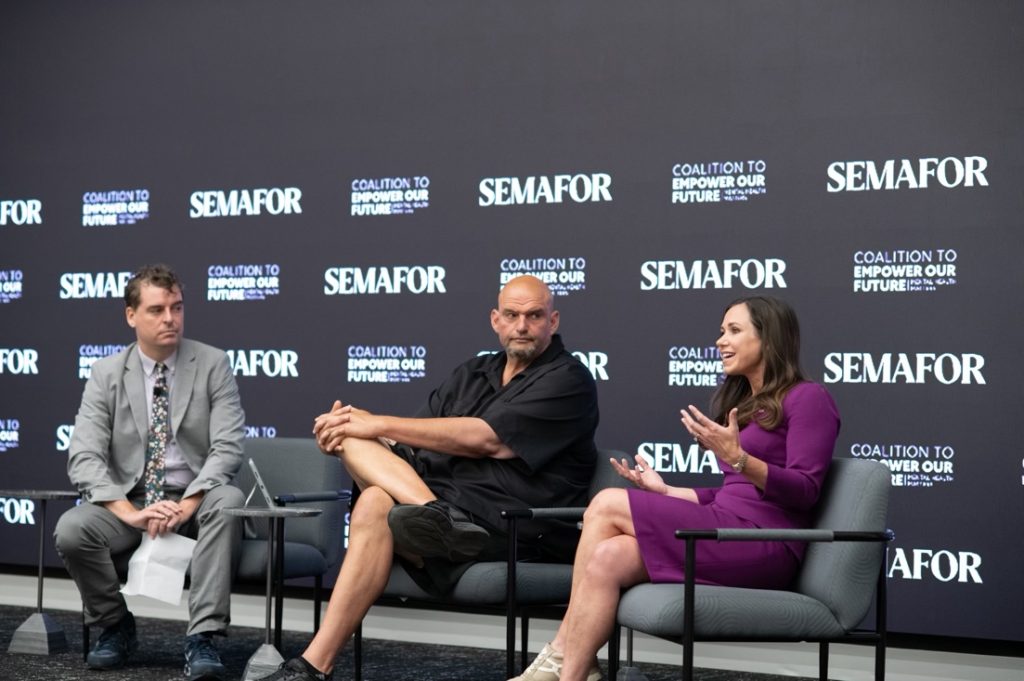ICYMI: U.S. Senators Katie Britt and John Fetterman Discuss Youth Mental Health at Semafor Event
‘We don’t have to ask parents what this is like, we are actually living this’
WASHINGTON, D.C. – U.S. Senator Katie Britt (R-Ala.) joined Senator John Fetterman (D-Pa.) to discuss the youth mental health crisis at Semafor’s “Solving the Youth Wellbeing Challenge” event. The Senators voiced their concerns of social media’s impact on mental health, particularly on our nation’s youth, and championed their bipartisan legislation, including the Stop the Scroll Act and the Kids Off Social Media Act.

Excerpts from Senator Britt at the event are below. The full interview can be viewed here.
On the importance of passing legislation for social media:
“There are so many of us that struggle with different aspects of social media and you think, we’re adults. We should be able to handle this and absorb this. But we think about our children, in particular, and knowing what we know now versus what we did when we passed the first piece of online legislation, which, by the way, MySpace wasn’t even a thing the last time we passed legislation on this. So, I think we came to the table, not as Democrats or Republicans, but truly as concerned parents that are looking at the data, and then are also looking at what’s happening within our own homes or with our friends, and realize the struggle that’s happening with young people.
“I think John and I believe that doing nothing is not an option, that our kids deserve better. Putting up the proper guardrails, the proper safety nets to allow them to continue to explore, but to do so in a more responsible manner is incumbent on us as legislators. So, we came together on Stop the Scroll which is just a very simple piece of legislation that says that there should be a warning label on social media that tells you about the mental health challenges that can occur. We didn’t dictate what was on there, we said that’ll be between the Surgeon General and FTC.
“The only thing John and I wanted was a link to help, where if there is some person who feels like they cannot go on another day, they can click on that link and hopefully be connected with someone that shows them a brighter future.”
On the dangers of social media:
“On TikTok, the data shows that the first [2.6] minutes you’re on there … you get delivered something about suicide, the first 8 minutes … (the) algorithm (pushes content) about an eating disorder. We see what’s happening to our young people, whether it is young women who on Instagram, it was proven they took a selfie and when they deleted it, they sent them beauty products. Whether it is pornography sites, whether it is online gambling, I mean these things are also being driven to our kids as well.
“I think we feel a unique obligation because we’re not talking to our grandkids … We’re actually living this. We don’t have to ask parents what this is like … and I think that that adds an additional layer of urgency with us because we understand that there are so many parents out there that are helpless in these moments. Social media has become a way to communicate … It’s become such a part of life that it’s hard to separate your children from it and we just have to do better.”
On working across the aisle on this commonsense legislation:
“We have to have a lot of tough conversations in this country … but if you really want a tough conversation to yield results, it’s going to have to be an honest conversation. And you are absolutely never going to have an honest conversation with someone that you don’t both trust and respect. So, these types of friendships … are essential to actually getting to 60 votes or actually doing good things for the American people …
“John says this all the time, ‘The people of Pennsylvania and the people of Alabama sent us up here to do good.’ Where we share a common goal, I think we have a duty to those people to get in a room and try to figure out a pathway forward.”
###